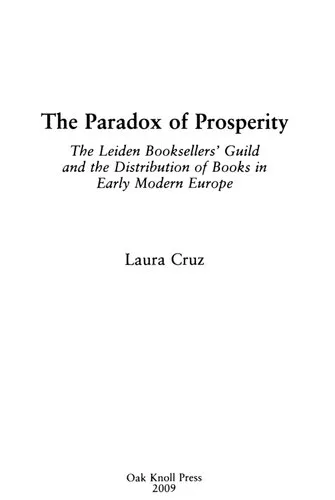The Paradox of Prosperity. The Leiden Booksellers' Guild and the Distribution of Books in Early Modern Europe
4.4
Reviews from our users

You Can Ask your questions from this book's AI after Login
Each download or ask from book AI costs 2 points. To earn more free points, please visit the Points Guide Page and complete some valuable actions.Introduction to 'The Paradox of Prosperity'
Welcome to an in-depth exploration of the intricate and fascinating world of early modern European book distribution through the lens of the Leiden Booksellers' Guild. "The Paradox of Prosperity" delves into the complex mechanisms and cultural implications of the book trade in a rapidly changing society.
Detailed Summary of the Book
In "The Paradox of Prosperity," we embark on a journey through the heart of the European book trade during the early modern period, a time when the world was reconfiguring itself with rapid advancements in printing technology, trade, and literacy. Central to this narrative is the Leiden Booksellers' Guild, an institution that exemplifies the dual nature of prosperity and constraint inherent in the book industry.
The book explores how the guild not only facilitated but also regulated the flow of books across Europe, navigating complex relationships with religious, political, and economic forces. Readers will discover the paradox of prosperity, where growth in trade and ideas often led to new forms of control and limitations. By examining the guild's internal records, external relations, and its impact on broader European society, "The Paradox of Prosperity" reveals the underpinnings of modern economic and cultural networks.
Key Takeaways
Our exploration yields several crucial insights that can be applied to both historical and contemporary analyses of trade and culture:
- Understanding the interconnectedness of trade, culture, and politics in shaping societal change.
- Examining how institutions can simultaneously empower and restrict innovation and dissemination.
- Appreciating the role of commercial guilds in the cultural economies of early modern Europe.
- Recognizing the enduring patterns and challenges within the dissemination of knowledge.
Famous Quotes from the Book
The book is peppered with insightful observations and reflections. Here are a few that stand out:
"Prosperity and paradox are bedfellows in the story of European book distribution, where growth invariably beckons complexity."
"The guild stood as both gatekeeper and gateway, a paradox of protection and restriction."
"As books traversed borders, so did ideas, kindling the fires of enlightenment and reform."
Why This Book Matters
"The Paradox of Prosperity" is a vital resource for historians, economists, and cultural theorists interested in the dynamics of information dissemination and control. It offers a unique perspective on the historical antecedents of today's information economy, reminding us that the challenges faced by early modern booksellers resonate with modern-day content distributors. By navigating the tensions between innovation, regulation, and dissemination, this book provides invaluable lessons relevant to our current digital age.
Free Direct Download
Get Free Access to Download this and other Thousands of Books (Join Now)
For read this book you need PDF Reader Software like Foxit Reader


